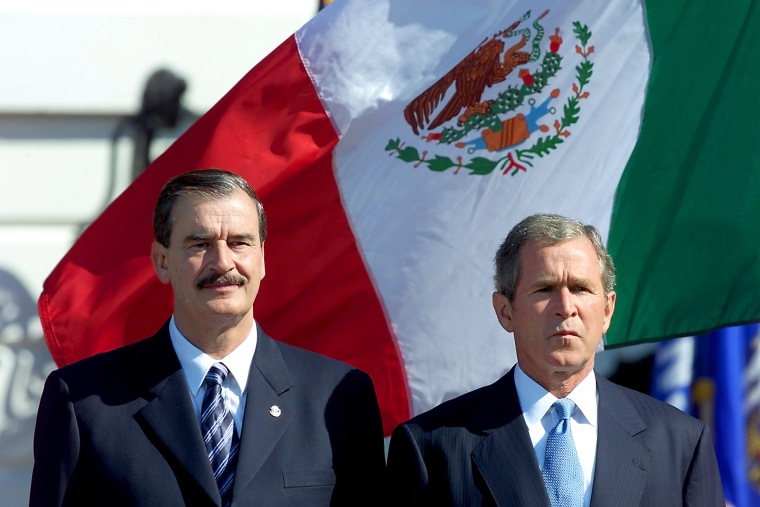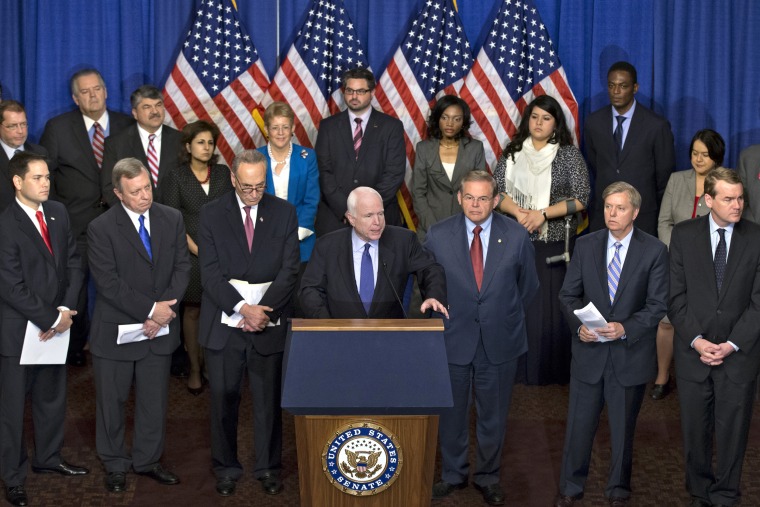[ad_1]
As President Joe Biden heads to the southern border for his first visit as president, the nation remains stuck with outdated immigration laws and border enforcement — and little chance for major change.
Congress’ failure to pass any meaningful immigration reform stretched to more than two decades in the last session, which ended last month. Over and over, attempts have collapsed — including bipartisan efforts and those with strong presidential backing. Instead, most changes on immigration have been achieved only through funding bills, small provisions in other legislation, regulations and executive authority.
Here’s a timeline of Congress’ failure on immigration since President Bill Clinton left office.
2001 — President George W. Bush and Mexican President Vicente Fox, friends from Bush’s days as governor of Texas, held high-level discussions on a comprehensive immigration reform plan that they hoped would build a guest worker program and provide legalization for what were then about 8.5 million undocumented people in the U.S. Both made the issue a top priority, with Bush making Mexico the destination for his first foreign visit and Fox attending the Bush’s first state dinner. But it all fell apart a few days after the dinner when terrorists hijacked four planes and attacked the World Trade Center in New York and the Pentagon on Sept. 11, 2001. The attacks led to a marked shift in immigration policymaking.

2005 — Sens. John McCain, R-Ariz., and Edward Kennedy, D-Mass., drafted the Secure America and Orderly Immigration Act, better known as the McCain-Kennedy bill. It would have provided six-year work visas for people not legally in the U.S. and a chance for people not legally in the country to become legal residents after having paid fines and passed background checks. The bill would have created an “essential worker visa” that would have allowed 400,000 workers a year to work in the U.S., as well as a path to a legal residency. It never got a vote in the Senate.
2005-06 — House Republicans drafted an enforcement-only bill, also known as the Sensenbrenner bill after a chief author, former Rep. James Sensenbrenner, R-Wis. The bill included harsher penalties for illegal immigration and would have classified people in the U.S. illegally and anyone who helped them as felons. It also called for hundreds of miles of fencing along the U.S.-Mexico border. The harsh provisions triggered massive protests around the country, mostly by Latinos. The bill passed the House, and the Senate passed the Comprehensive Reform Act of 2006, which was backed by the Bush White House. Differences in the two bills were never reconciled.
2007 — Senate Majority Leader Harry Reid, D-Nev., pushed a compromise bill that included a path to citizenship, visas for high-skilled workers and funding for more border barriers, border enforcement technology and agents. The bill had bipartisan support from Sens. Jon Kyl, R-Ariz., Lindsey Graham, R-S.C., and others, and it had solid backing from Bush. It failed to get a vote in the Senate.
2013 — With President Barack Obama in the White House, a bipartisan group of senators, nicknamed the Gang of 8, negotiated an immigration reform bill that was approved in the Senate. The bill included a path to legal status and eventual citizenship, and it established “goals,” such as putting up 700 miles of border fencing and getting an employment verification system up and running before people who were in the country illegally could apply for legalization. It also would have added as many as 40,000 Border Patrol agents. A less celebrated bipartisan group of eight members was working on a bill in the House, but it disintegrated without having introduced a bill. House Speaker John Boehner, R-Ohio, announced that there would be no movement on immigration.

So what about 2023? Heading into the next session, Republicans control the House and Democrats are in charge of the Senate — both with only slim margins.
The House was stagnated in the first week of the new Congress as a bloc of ultraconservative members held up the election of Republican leader Kevin McCarthy of California. The newly elected speaker has said no amnesty bill would come to the House floor.
Given the infighting, the current arrivals at the border of migrants seeking asylum and the looming 2024 presidential elections, the prospects for a breakthrough that includes enforcement and legal pathways for immigrants are not promising, said Michelle Mittelstadt, a spokeswoman for the Migration Policy Institute.
[ad_2]
Source link
